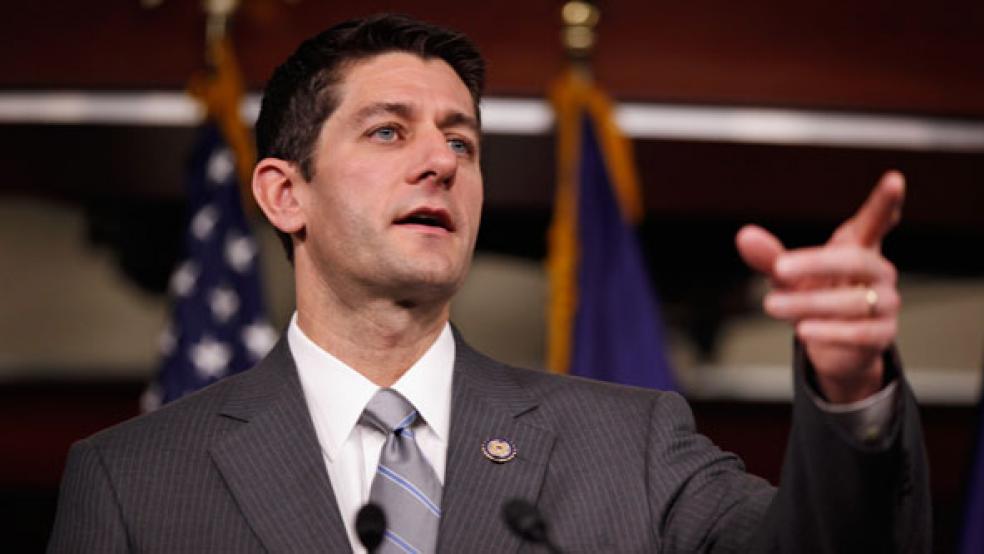House Budget Committee Chairman Paul Ryan, R-Wisc., and members of his committee unveiled a set of 10 bills on Wednesday that would change the congressional budget process in what Ryan said is an attempt to “avert a European -type debt crisis.” But budget experts say the measures are unlikely to pass a divided Congress.
The set of proposals, which must be voted on by the full Congress, include shifting to a two-year budget cycle, removing automatic inflationary increases built into discretionary spending, and a measure that would create binding limits on federal spending to cap it at no more than 20 percent of gross domestic product. Ryan said the Republican package is designed to strengthen spending controls, enhance oversight and increase transparency.
“Washington stumbles from budget crisis to budget crisis, with little to no oversight of how government spends hardworking taxpayers’ money,” Ryan said. The incentives currently favor those who want to spend more, and the result is a crushing burden of debt that is hurting economic growth today and threatening economic prosperity tomorrow.”
But some budget experts say these bills won’t move the needle on the issue and are unlikely to pass through a divided Congress, which is currently at an impasse again over extending the payroll tax cut.
“They won’t make a damn bit of difference,” said Stan Collender, former staffer on both the House and Senate budget committees. “You don’t change the budget process before you have a consensus on what you want to do on the budget. That consensus on Capitol Hill doesn’t exist as the Super Bust committee showed.” Collender called the proposals “grandstanding” on Ryan’s part.
Ryan said he aims to move the bills out of committee in early spring. He is a co-sponsor for each of the bills that are authored by other committee members.
Among the ten bills is a measure authorizing the line-item veto, sponsored by Rep. Chris Van Hollen, D-Md., who is ranking member on the budget committee. The bipartisan effort is something that has been sought by presidents since Richard Nixon. President Obama proposed a measure similar to the Van Hollen bill last year and supports the general idea of a line-item veto. Ryan is moving the bipartisan bill through the Budget Committee next week for markup.
Van Hollen said the initiative gives the President a tool to go after unjustified spending while protecting Congress’ authority to make spending decisions. “Taxpayers deserve a system that is accountable, and this bipartisan legislation will provide another tool to ensure that we are good stewards of their money,” he said in a statement.
Another bill, the Government Shutdown Prevention Act, is sponsored by Republican Rep. James Lankford of Oklahoma. The bill is designed to avoid lapses in government funding and services if Congress fails to pass a budget or the corresponding appropriations bills in a fiscal year. In the event that Congress fails to approve a budget by the end of the fiscal year, automatic triggers kick in a continuing resolution or a short-term, stop gap spending device. This would be accompanied by a 1 percent decrease in discretionary spending.
“Every time Congress reaches an impasse at a budget deadline, the easiest fallback position is yet another continuing resolution that funds the government at current levels,” Lankford said. “This is irresponsible and untenable. This legislation will put an end to the government shutdown madness.”
Here is the complete list of the 10 bills unveiled today:
- Legally Binding Budget Act—convert the budget process from a concurrent to a joint resolution that would require the President’s signature.
- Spending Control Act—establishes binding limitations on federal spending and limitations, enforced by a sequester of no more than four percent of programs.
- Expedited Line-Item Veto and Rescissions Act—expedited consideration by Congress of specific Presidential requests to reduce discretionary spending.
- Biennial Budgeting and Enhanced Oversight Act—shifts to a two-year budget cycle.
- Baseline Reform Act—ends automatic inflationary increases built in to discretionary spending.
- Government Shutdown Prevention Act—if Congress fails to adopt a budget, triggers will kick in to fund the government at a reduced level.
- Review Every Dollar Act—periodic sunset reviews and reauthorization of all federal programs.
- Balancing Our Obligations for the Long Term Act—caps total federal spending at 20 percent of GDP in a decade.
- Budget and Accounting Transparency Act—brings the USPS on budget and incorporates Fair Value accounting principles.
- Pro-Growth Budgeting Act—the Congressional Budget Office would be required to provide an assessment of the macroeconomic impact of major legislation.





